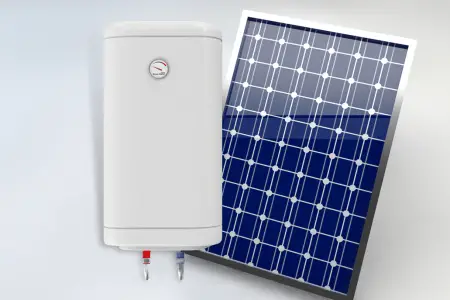Does a solar water heater work in winter? They do. Its efficient insulation allows the solar water heater to work in winter. While the use of an antifreeze liquid and reduction of heat in the sun’s rays will make it less efficient, the solar water heater will still continue to supply hot water in freezing conditions.
Here’s what that means.
From April through September, when the sun is shining at its brightest, your solar water heater will be able to meet all your hot water needs. In winter, though, short days and a weaker sun mean you might be getting as low as 10% to 20% of hot water from your solar water heater.
Read on to find out more about how solar water heaters work in the winter.
Can I Use a Solar Hot Water Heater in the Winter?
You can use a solar water heater in the winter season, but make sure it’s protected against freeze-ups. This means that your heating system either needs to feature a drainback or it must have some kind of antifreeze to prevent water from freezing up in the pipes. We have discussed how you can keep your solar heater from freezing in much more detail in the following section.
Even after taking these precautions, the solar water heater might only meet 10% to 20% of your hot water needs on days when it gets excessively cloudy. Which is why we suggest you invest in a unit that comes with a backup – either an electric or gas water heater that would kick in when climate conditions won’t permit the solar water heater to operate at full capacity.
How Do I Keep My Solar Water Heater from Freezing?
Make sure to take the necessary steps to protect your solar water heater from freezing, as it’s the greatest danger to the heater. Most solar heater manufacturers don’t include freeze damage in the list of damages covered under warranty.
That’s probably because they know that one freeze is all that takes to destroy the solar water heater, regardless of how pricey the whole setup is. Here’s how you could keep your solar water heater from freezing:
1) Use an Antifreeze
Use an antifreeze as the heat transfer fluid to keep your solar water heater from freezing. Propylene glycol and ethylene are the two most common antifreeze solutions. Which of the two you should select will come down to your personal choice. Propylene glycol isn’t as toxic as ethylene glycol, though the latter boasts far greater heat transfer properties.
2) Use a Drainback System
Another way you can keep your solar water heater from freezing is by using a drainback system. A drainback system relies on a temperature sensor and a pump to circulate water, or a mixture of water and antifreeze, when the sun stops heating, or it gets too cold out there. By keeping the heat transfer fluid in motion, it reduces the risk of the cold weather freezing it.
How Big of a Solar Water Heater Do I Need for My Household?
According to a rule of thumb, if you’ve a south-facing roof, you’d need a minimum of 40 square feet of solar collector area for the first two persons in your home. That means a minimum of 20 square feet area for each of the first two persons.
For every additional person who would be relying on the solar heater for hot water, you’d need an extra 12 to 14 square feet per person.
Here’s what that means:
- If you have a 4-member household – a minimum of 64 square feet area is required on the roof for the solar collector
- If you have a 6-member household – a minimum of 88 square feet area will be needed for the solar collector on the roof
Have more members in your home who would be using hot water? Add 12 square feet for every additional member that would be relying on the solar water heater.
How Do I Get Hot Water in Winter If the Solar Water Heater Isn’t Working at Full Capacity?
With solar water heaters meeting 10% to 20% of hot water demands in frigid weather or cloudy days, it’s obvious that you need a backup source for hot water.
Luckily, most solar water heaters come with one. Most manufacturers either include an electric or a gas water heater in the package for days when it’s too cloudy for the solar water heater to generate hot water.
Here’s how you can decide whether to invest in an electric or gas heater backup:
- Use electric water heater as backup. Apart from being simple to install, electric water heaters cost low upfront, are easy to use, and are environmentally friendly. However, they have higher operating costs and take some time to heat water.
- Use a gas water heater as a backup: Gas water heaters might cost higher upfront and are difficult to install than their gas counterparts. However, they have low operating costs, heat water faster and won’t leave you without hot water during blackouts.
Does Solar Water Heater Work in Rainy Season?
Many people are surprised to find out that solar water heaters work really well in the rainy season, with their efficiency equal to or very close to 100% in the wettest of seasons. Know why? Solar water heaters need only two things to work and supply hot water: a little bit of sun and an uninterrupted water supply. As long as it’s getting both, you could count on the solar heater to supply hot water 24*7.
Yet another feature that enables solar water heaters to work in a rainy season is their solar panels, which are 100% waterproof. This means that no amount of rain could damage them. In the rare scenario that the storm damages the panels, you could always consult with your solar panel manufacturer – almost all of them provide an equipment warranty covering any damage to the panels.
How Long Do Solar Water Heaters Last?
According to the US Department of Energy, Energy Star® certified solar water heating systems last up to 20 years. This makes them much long-lasting than either standard gas water heaters – which have an average life expectancy of 15 years – or electric storage water heaters – whose life expectancy varies between 8 and 12 years.
Follow these steps to extend the life of your solar water heater:
- Drain the water once per annum, which will keep sediment from accumulating at the bottom of the heater and reduce corrosion.
- Inspect the piping, ducts and wiring for signs of damage.
- Replace the antifreeze solutions every 3 to 5 years.
- Reduce the risk of scaling by using a mildly acidic solution (such as vinegar) or by circulating water softeners through the solar water heater’s loop every 3 to 4 years.
- Drain the entire system, either automatically or manually, when there’s a weather forecast of temperature dropping below the antifreeze liquid’s freezing point.
- Check the temperature sensor at least once per year to ensure it’s operating correctly: a faulty sensor might fail to detect freezing conditions, causing sever damage to the heater.
Conclusion
There’s a common misconception that solar water heaters do not work in winter. Another popular myth about these heaters is that they can’t supply hot water when there’s no sun. Both these theories are just that, theories. There’s no truth to them.
Sure, the efficiency of a solar water heater will drop in winter – which is why every solar manufacturer tells you to arrange a backup water heating option. But these units will be able to meet 10-20% of your hot water needs, even when it’s freezing out there.

I graduated with a degree in Chemical Engineering and have written for a number of nationally recognized publications in the home improvement space. My skills include fluid mechanics and process engineering and I have worked on numerous projects, including in waste water flow rate calculation and heat balance of steam rollers in the paper industry. My goal as a technical writer is to make complicated topics easy to understand for the average person.
